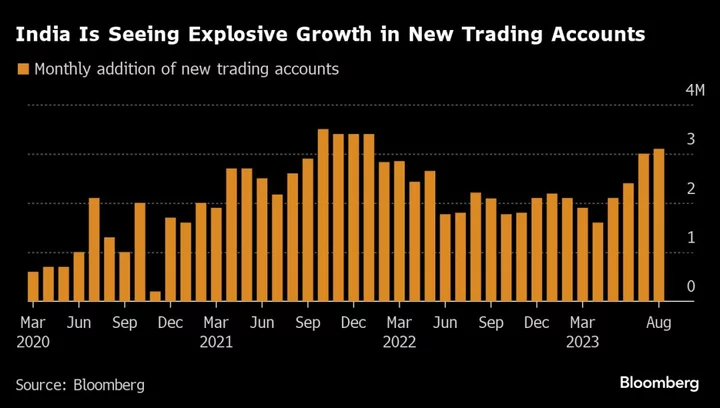
India’s Regulator Turns Up Heat on Influencers as Stocks Boom
India’s legion of financial influencers are once again under the spotlight as the country’s market regulator ramps up
2023-10-29 08:55
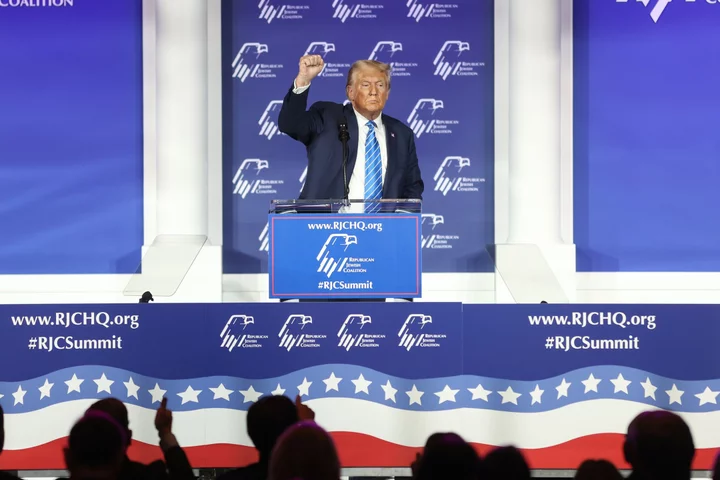
GOP Presidential Hopefuls Call for Unconditional Israel Support
Republican presidential candidates offered full-throated support for Israel to defend itself and lambasted President Joe Biden’s policies in
2023-10-29 05:21
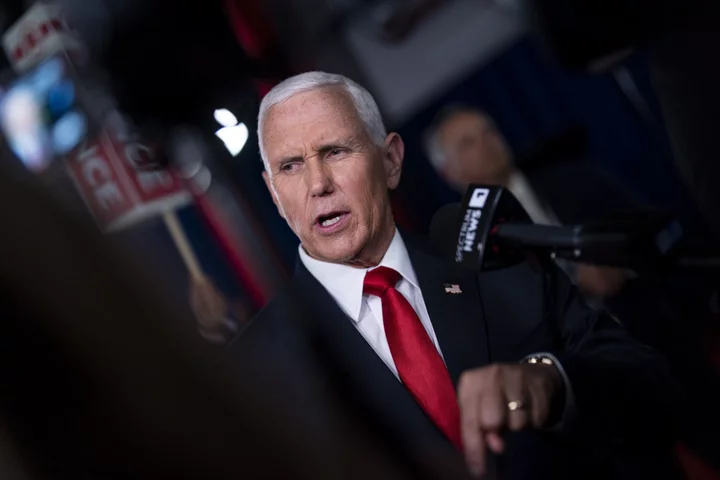
Pence Ends 2024 Campaign Against Trump in Sudden Early Exit
Former Vice President Mike Pence suspended his presidential campaign Saturday, ending his quest to unseat former running mate
2023-10-29 04:23
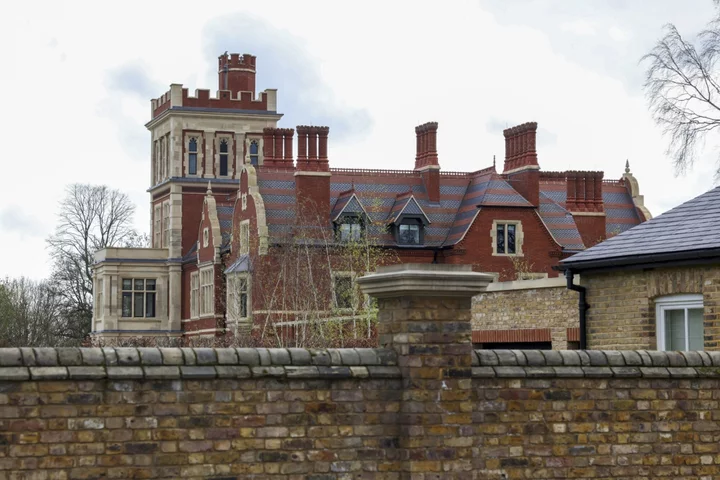
Sanctioned Tycoon Denied Extra Cash By UK Court
Russian billionaire Mikhail Fridman failed to win some relief from strict sanctions imposed on him, after a UK
2023-10-28 23:47
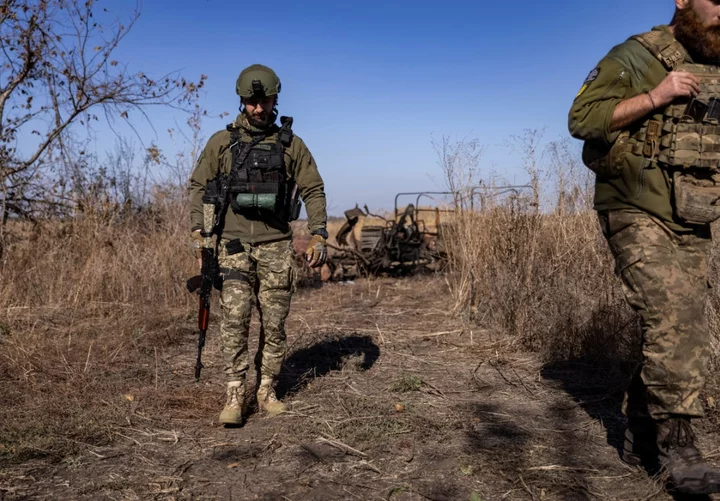
Ukraine-Russia war - live: Putin ‘loses entire brigade’ as Moscow suffer painful losses in latest battle
Russian troops have lost “at least a brigade of troops” during their latest offensive in the ruined city of Avdiivka, with Ukrainian president Volodymyr Zelensky claiming they had suffered “painful losses”. This comes as news emerged that Putin’s troops had been executed for retreating from the offensive in the eastern city in Donetsk, according to the White House. “We have information that the Russian military has been actually executing soldiers who refuse to follow orders,” White House spokesperson John Kirby told a media briefing on Thursday. Ukrainian forces have been repelling the Russian onslaught on the frontline in Donetsk for several weeks since mid-October. In a call to Rishi Sunak, Zelensky said: “The invaders made several attempts to surround Avdiivka, but each time our soldiers stopped them and threw them back, causing painful losses. In these cases, the enemy lost at least a brigade.” Meanwhile, Oleksandr Shtupun, a spokesperson for Ukraine‘s southern groups of forces, said last week that Russian forces had suffered over 400 casualties a day in its campaign which has relied on small assault groups of 30 to 40 men. Read More A Russia without Putin? Be careful what you wish for... Moscow succession: What would happen if Putin dies? Russia is executing its own retreating soldiers as Ukraine offensive fails, says US
2023-10-28 21:26
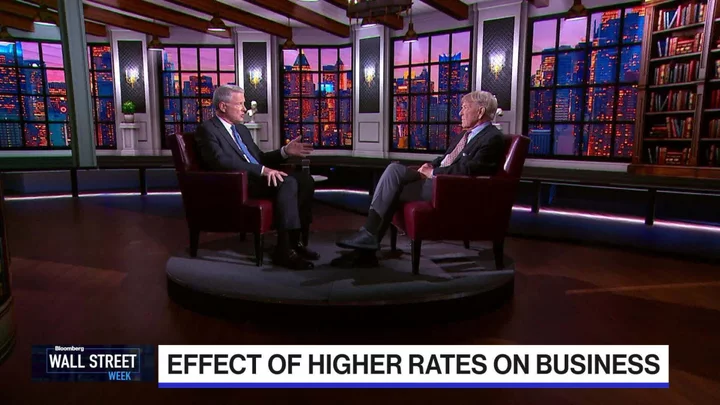
Israel Escalates Ground Operations In Gaza After Aerial Blitz
Israel is ratcheting up ground operations in Gaza with troops, tanks and artillery battling Hamas fighters after the
2023-10-28 19:25

The Energy Chief Trying to Show Sunak That the UK Needs Carbon Capture
Centrica Plc boss Chris O’Shea is on a mission to show the UK government that it needs to
2023-10-28 18:50
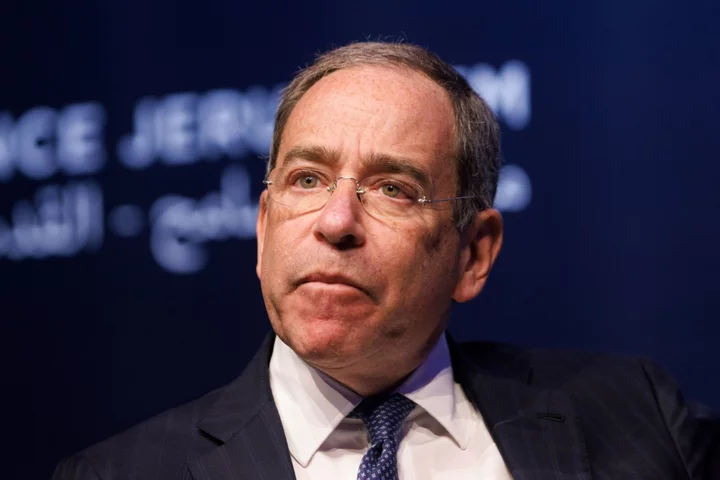
Ex-US Envoy to Israel Nides Leaves Wells Fargo Post to Focus on Middle East
Tom Nides, who stepped down as US ambassador to Israel in July, is leaving Wells Fargo & Co.
2023-10-28 06:29
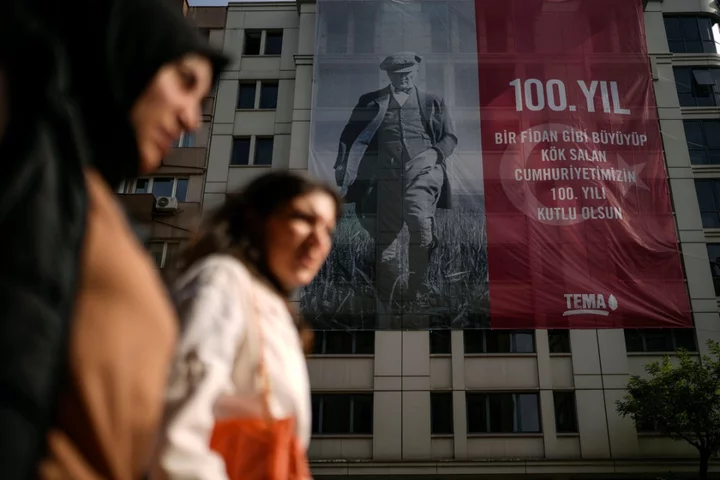
As modern Turkey turns 100, what’s next for Kemal Ataturk’s republic
The Turkish Republic, founded from the ruins of the Ottoman Empire by the national independence hero Mustafa Kemal Ataturk, turns 100 on Sunday, October 29. Ataturk established a Western-facing secular republic modeled on the great powers of the time, ushering in radical reforms that abolished the caliphate, replaced the Arabic script with the Roman alphabet, gave women the vote and adopted European laws and codes. Turkey has, however, taken on a more conservative character under the two-decade-old rule of President Recep Tayyip Erdogan, whose party has roots in the country's Islamic movement and who has become Turkey's most influential leader since Ataturk. The centennial offers Erdogan, re-elected for a third term in May, a chance to redefine the country and propel it into a new era he has dubbed “Turkey’s Century.” Here is a look at some of the republic’s greatest accomplishments, and controversial realignments as it embarks on its second century. Religious identity The secular vs. conservative debate remains one of the most contentious cultural divides in Turkey. Ataturk, the nation’s founding father, envisioned a secular country as a prerequisite to modernity. Over the decades, the separation of religion and state became a deeply ingrained ideology. The country went on to impose bans on headscarves in schools and public institutions, brought restrictions on religious education, adopted liberal policies on alcohol, and even converted the main Ottoman imperial mosque, the Hagia Sofia, into a museum. All these policies have been reversed under Erdogan, who has shifted the country toward conservatism. Now official functions open with prayers, the Directorate of Religious Affairs has been given a budget which dwarfs most ministries, the number of religious schools have increased and even Erdogan’s unorthodox economic policy of reducing interest rates - abandoned recently - was justified on religious grounds. “Ataturk was a ... top-down politician who believed in social engineering and he wanted to refashion Turkey as a secular, West-facing, European society," said Soner Cagaptay, an expert on Turkey at the Washington Institute and author of several books on Erdogan. "Erdogan, too, believes in top-down social engineering. While his method is similar to that of Ataturk, his values are almost the exact opposite.” Diplomacy The Western-oriented country joined NATO in 1952 and is officially a candidate to join the European Union - although the membership negotiations have now come to a standstill. Turkey’s interests generally aligned with those of Western countries for much of the 20th century. In recent years, however, Turkey has adopted a much more assertive foreign policy which aims to extend Ankara’s reach both regionally and worldwide. This new independent diplomacy is just as likely to pit Turkey against Western interests as it is to align with them. One recent point of tension between Turkey and the West has been in Syria, with Turkey frequently launching attacks against local Kurdish forces which Europe and the United States consider allies and Turkey considers as off-shoots of the outlawed Kurdistan Workers’ Party, or PKK. Turkey now controls large swaths of territory in Syria and speaks of creating a buffer zone along its borders with Syria and Iraq against Kurdish fighters. Following Russia’s invasion of the Ukraine, both Sweden and Finland decided to abandon their long-standing neutrality and join NATO. Yet Turkey became the main holdout against Swedish membership, accusing Sweden of being too soft toward the PKK and other groups outlawed by Turkey. Turkey’s new, pragmatic foreign policy also extends to its relations with Russia, a major trading partner. While most NATO countries took a strong stance against Moscow over its invasion of Ukraine, Ankara has maintained close ties even as it opposes the war. While impeding NATO’s cohesion, Turkey’s non-alignment does put it in a unique position where it can act as mediator in global conflicts, including the war in Ukraine. Cagaptay sees similarities in Ataturk's and Erdogan's goals of wanting to turn Turkey into a great power. But whereas Ataturk decided to embrace and copy policies of European powers of the time, Erdogan “has no interest in folding Turkey under Europe and believes he can achieve this on his own,” Cagaptay said. Defence industry Turkey faced arms embargos after its 1974 invasion of Cyprus following a coup by supporters of union with Greece, and over its military offensive against Kurdish groups. More recently the country was kicked out of a U.S.-led fighter jet program over its purchase of a Russian missile defense system that angered NATO allies. Restrictions on arms sales, however, are becoming less and less of a burden, because of Turkey’s burgeoning domestic arms industry. Turkish officials maintain that Turkey’s defense industry has grown from 20 percent domestic production to 80 percent. This “local and indigenous” production ranges from rifles and tanks to assault ships and a new fighter jet, Kaan, which is planned to fly in 2028. Turkey has also become a major exporter of arms, most notably its domestically manufactured combat drones. Turkish-manufactured drones have made it into the arsenals of many countries, including Ukraine, the United Arab Emirates, Poland and Azerbaijan. Bayraktar drones, owned and designed by the family of Erdogan’s son-in-law Selcuk Bayraktar, have proven particularly effective in the Ukraine war. Modernisation Ataturk’s reforms and drive to modernize helped pull Turkey out of the deep poverty it suffered when the Ottoman Empire collapsed. Today, the country is a member of the Group of 20 most developed nations. The Erdogan era has become synonymous with a far-reaching construction boom. Highways, bridges, tunnels, pipelines, airports, hospitals and countless residences have all sprung up around the country. This new infrastructure is such a source of pride and legitimacy for Erdogan's government that it is frequently brought up on the campaign trail. With Turkey actively encourages the construction boom, critics say the government has adopted a careless attitude toward its regulation. After a devastating earthquake in February, lax enforcement of building codes was blamed for the widespread destruction. Some of Erdogan’s more ambitious projects have also been points of political contention, from the giant palace built for the president in Ankara to smaller luxury palaces built around the country. His most ambitious proposal yet, a grand canal through Istanbul, has raised fears of harm to the environment and local ecosystem. Challenges Turkey's previous hundred years witnessed military coups, economic crises and a succession of often unstable governments. Today, it faces a host of unresolved issues, including the fight against Kurdish rebels, which has been going on for four decades and doesn’t look any closer to resolution despite daily military operations in Turkey, Syria and Iraq. Turkey's assertive foreign policy means its relations with neighbors swing violently between friend and foe. The recent shift from a parliamentary system to a presidential one further eroded checks and balances, consolidating authority in the president’s hands. Its democratic backsliding, especially since a failed coup in 2016, frequently grabs international attention and seriously endangers its bid to join the EU. Transparency International ranks Turkey 101 out of 180 countries in corruption. Reporters Without Borders ranks Turkey 165 out of 180 countries in press freedoms, down from 149 the previous year. Last year, the Economist Intelligence Unit ranked Turkey 103 out of 167 in its democracy index, classifying it a hybrid regime between an authoritarian state and a flawed democracy. In addition to all this, its economy has been facing a serious downturn in recent years, with inflation in the high double digits. Most experts forecast that inflation will be further exacerbated by the high costs of reconstruction following the earthquake that killed 50,000 people. Read More Pope Francis prays for a world in 'a dark hour' and danger from 'folly' of war Turkey’s president submits protocol for Sweden’s admission into NATO Separatist lined up to be Putin’s puppet leader in Ukraine ‘is shot in Crimea home’ Separatist lined up to be Putin’s puppet leader in Ukraine ‘is shot in Crimea home’ EU summit turns its eyes away from Ukraine despite a commitment to stay the course with Zelenskyy Russia-Ukraine war: Putin’s troops ‘executed for retreating’
2023-10-28 03:23
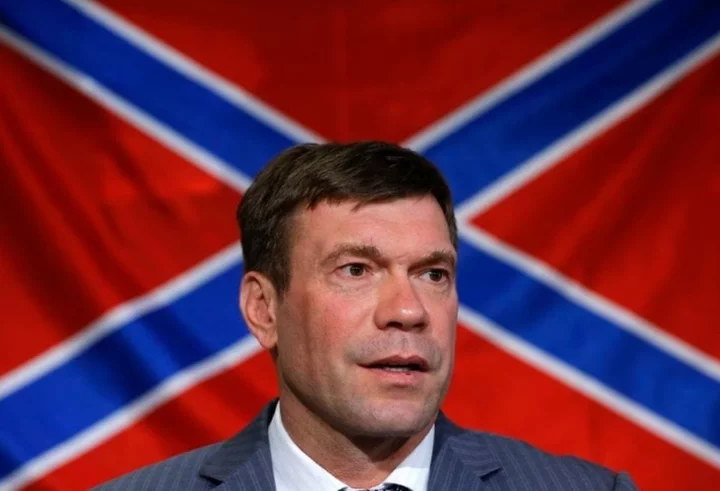
Separatist lined up to be Putin’s puppet leader in Ukraine ‘is shot in Crimea home’
A pro-Russian former politician in Ukraine is fighting for his life after being shot in his Crimea home, an official has said. Oleg Tsaryov, who was reportedly being lined to lead a puppet administration in the Ukrainian capital Kyiv after Russia’s invasion, is in intensive care in hospital, Vladimir Rogov, a Russian-installed official in southern Ukraine, said. He was reportedly shot twice at around midnight at his home in Crimea. “Oleg’s condition is very serious. He is currently in intensive care," Mr Rogov wrote on the Telegram messaging app. Sources told Reuters last year that Russia had been lining up Mr Tsaryov to head a puppet government in Kyiv after Moscow’s forces invaded on 24 February. Mr Tsaryov himself dismissed that possibility when The Financial Times reported it, citing US intelligence, ahead of the invasion. He told the paper at the time that the idea was "pretty funny" because he was just running a wellness business in Crimea and was "not important enough". Previously, Mr Tsaryov had been a member of the Ukrainian parliament and then speaker of the parliament of "Novorossiya", an entity formed after Russian-backed separatists in eastern Ukraine broke away in 2014 and began fighting Ukrainian forces. News of the shooting comes amid continued fighting on the frontline where Russian troops have been executed for retreating from key battles. US intelligence said Russian soldiers had been fleeing the frontline in the Kremlin’s offensive in the eastern city of Avdiivka, Donetsk. “We have information that the Russian military has been actually executing soldiers who refuse to follow orders,” White House spokesperson John Kirby told a media briefing on Thursday. Ukrainian forces have been repelling the Russian onslaught on the frontline in Donetsk for several weeks since mid-October. Meanwhile, the alternative Black Sea export corridor will continue to function despite all threats, Ukraine president Volodymyr Zelensky said on Friday morning. The presidential office reported that Mr Zelensky discussed the operation of the route as well as vessel insurance during a phone call with British prime minister Rishi Sunak. On Thursday, the Kyiv-based Barva Invest consultancy, British security firm Ambrey and a specialised outlet, Ukrainian Ports, reported that Ukraine had suspended use of the corridor due to a possible threat from Russian warplanes and sea mines. Additional reporting by agencies Read More War-weary mothers, wives and children of Ukrainian soldiers demand a cap on military service time Russia-Ukraine war: Putin’s troops ‘executed for retreating’ Abortion restrictions in Russia spark outrage as the country takes a conservative turn As the Turkish Republic turns 100, here's a look at its achievements and challenges ahead Russia is executing its own retreating soldiers as Ukraine offensive fails, says US White House says Russia is executing its own soldiers for not following orders
2023-10-27 22:29
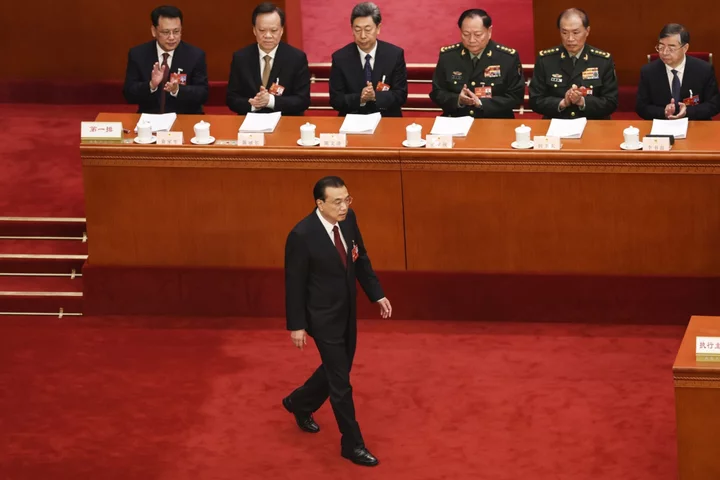
China’s Ex-Premier Li Keqiang, a Reformer Sidelined by Xi, Dies
China’s former Premier Li Keqiang, who gained a reputation as a reformer but later found himself sidelined by
2023-10-27 20:15
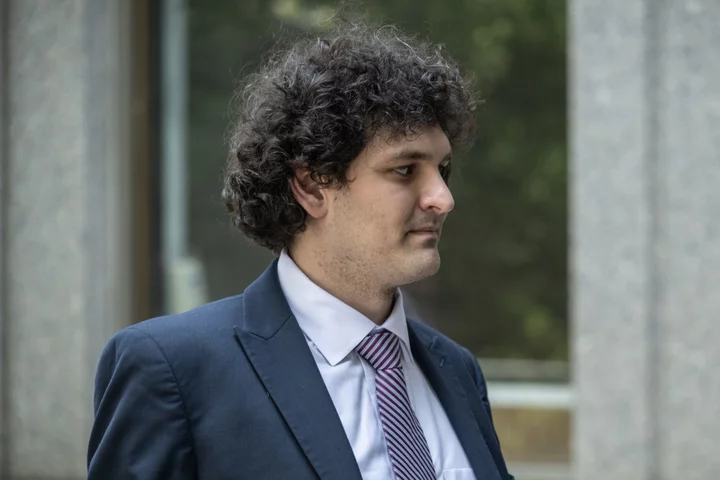
Signal Chats, Legal Advice, ‘I Don’t Recall’: SBF on the Stand
FTX co-founder Sam Bankman-Fried will take the stand Friday in his own defense, but the world got a
2023-10-27 17:52
